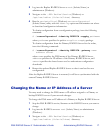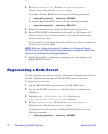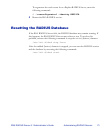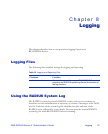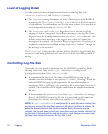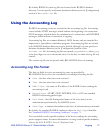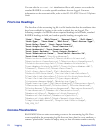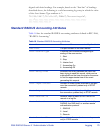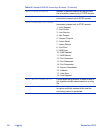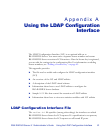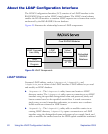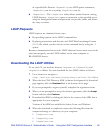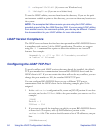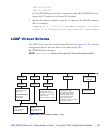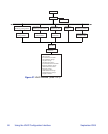
RSA RADIUS Server 6.1 Administrator’s Guide Logging 79
aligned with their headings. For example, based on the “first line” of headings
described above, the following is a valid accounting log entry, in which the value
of the Acct
-Status-Type attribute is 7:
"12/23/1997","12:11:55","RRAS","Accounting-On",
,,,,7,,,,,,,,,,,,,,,,,,,,,,,,,,,,,,,,,,,,,,,,,,
,,,,,,,,,,,,,,,,,,
Standard RADIUS Accounting Attributes
Table 16 lists the standard RADIUS accounting attributes defined in RFC 2866,
“RADIUS Accounting.”
Table 16. Standard RADIUS Accounting Attributes
User-Name
The name of the user as received by the client.
NAS-Port
The port number on the client device.
Acct-Status-Type
A number that indicates the beginning or
ending of the user service:
1 - Start
2 - Stop
3 - Interim-Acct
7 - Accounting-On
8 - Accounting-Off
Acct-Delay-Time
Indicates how many seconds the client has
been trying to send this record, which can be
subtracted from the time of arrival on the server
to find the approximate time of the event
generating this request.
Acct-Input-Octets
Number of octets (bytes) received by the port
over the connection; present only in STOP
records.
Acct-Output-Octets
Number of octets (bytes) sent by the port over
the connection; present only in STOP records.
Acct-Session-Id
Identifier used to match START and STOP
records in a log file.
Acct-Authentic
indicates how the user was authenticated by
RADIUS, the RAS itself, or another remote
authentication protocol:
1 - RADIUS
2 - Local
3 - Remote
Acct-Session-Time
Elapsed time of connection in seconds; present
only in STOP records.



